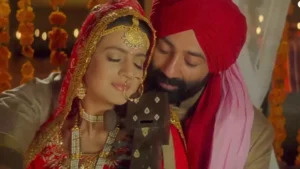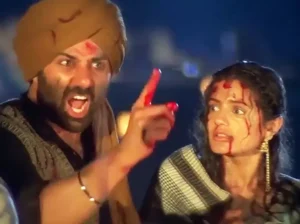“Gadar: When Love Transcends Borders -In Popular Culture”
In the vast realm of Bollywood cinema, certain movies manage to carve a niche for themselves that goes beyond their release dates. One such cinematic gem that continues to hold a special place in the hearts of audiences is the iconic film “Gadar: Ek Prem Katha.” Released in 2001, this movie didn’t just entertain, but it left an indelible mark on popular culture. With its blend of love, patriotism, and heart-wrenching drama, “Gadar” is a tale that transcends borders, both on-screen and in real life.

The Journey of Love and Patriotism
Directed by Anil Sharma and produced by Nitin Keni and Sunil Mehta, “Gadar: Ek Prem Katha” takes place against the backdrop of the tumultuous partition of India in 1947. The film delves into the life of Tara Singh (portrayed by Sunny Deol), a proud and resilient truck driver, whose path crosses with Sakina (played by Ameesha Patel), a Muslim woman caught in the throes of the communal divide.
At its core, “Gadar” is a love story that defies boundaries – not just geographical, but societal and religious as well. Tara’s unwavering love for Sakina, despite their different backgrounds, serves as a powerful metaphor for the unity that can transcend hate and prejudice. Their love story is set amidst the chaos and violence of partition, providing a poignant contrast between the brutality of man-made divisions and the purity of love.
Impact on Popular Culture
1. Dialogues That Resonate: One of the most significant contributions of “Gadar” to popular culture is its memorable dialogues. Lines like “Hindustan Zindabad tha, Zindabad hai, aur Zindabad rahega!” (Long live Hindustan, it was, it is, and it will be) and “Hand pump tod diya, lohe ka rod tod diya” (He broke a hand pump, he broke an iron rod) have become a part of everyday conversations. These phrases not only showcase Tara Singh’s fiery spirit but also evoke a sense of patriotic fervor that continues to inspire generations.
2. Iconic Music: No Bollywood film would be complete without its music, and “Gadar” hit all the right notes. The soul-stirring soundtrack composed by Uttam Singh resonated deeply with audiences. The melodious “Main Nikla Gaddi Leke” and the emotional “Udd Ja Kaale Kanwan” are songs that still find a place on playlists, reflecting the film’s emotional depth.
3. Symbol of Patriotism: “Gadar” didn’t just depict a love story; it showcased the unyielding love for one’s country. Tara Singh’s persona, his roaring passion for India, and his fearless actions on-screen turned him into a symbol of patriotism. Even today, Sunny Deol’s iconic dialogue expressing his love for Hindustan is often echoed during moments of national pride.
4. Cross-Border Love Narrative: The film’s portrayal of a cross-border love story resonated across the globe. Love knows no boundaries, and “Gadar” captured this sentiment perfectly. In an era of globalization, where the world is more interconnected than ever, the film’s message of love overpowering divisions continues to be relevant.
5. Emotional Rollercoaster: “Gadar” took audiences on an emotional rollercoaster. From the joy of love to the agony of separation, from the horrors of partition to the triumph of the human spirit, the movie tugged at heartstrings. This emotional resonance has contributed to its enduring popularity.
Real-Life Inspirations
While “Gadar” is a work of fiction, it draws inspiration from real-life events and emotions. The partition of India in 1947 remains a dark chapter in history, marked by immense suffering and displacement. The film serves as a reminder of the pain that people endured during those times and the importance of preserving unity.
Furthermore, the theme of love triumphing over societal barriers echoes the stories of countless couples who defied societal norms for love. Such stories continue to inspire those who face similar challenges in today’s world, encouraging them to follow their hearts and beliefs.ek prem kath
Legacy and Enduring Relevance
Twenty-two years after its release, “Gadar: Ek Prem Katha” continues to be celebrated and cherished. Its dialogues, music, and characters are firmly entrenched in the hearts of moviegoers. The film’s enduring relevance is evident in its continued references in various forms of media, including television shows, memes, and conversations.
Beyond its cinematic impact, “Gadar” has left an imprint on society’s collective consciousness. It serves as a testament to the power of love, the resilience of the human spirit, and the need for unity in the face of adversity. The movie’s themes remain pertinent, especially in an era when divisions and prejudices persist.
Conclusion
In the vast and ever-evolving landscape of popular culture, shines as a timeless tale that resonates with audiences across generations. Its portrayal of love that transcends borders, the emotional journey of its characters, and its depiction of unity in the face of division have solidified its place in the annals of Bollywood history. As audiences continue to discover and revisit this masterpiece, they are reminded that love knows no boundaries – be it geographical, societal, or cultural. “Gadar” encourages us to look beyond our differences and embrace the common threads that bind us as humans. In a world that often seems divided, this enduring message is a beacon of hope, reminding us that love and unity can conquer all.
